Your RV is your ticket to freedom and adventure. However, just like any vehicle, regular maintenance is key to ensuring a smooth and enjoyable journey.
The good news? Many essential RV checks are within your reach, and you can tackle them yourself without a trip to the mechanic.
This guide will equip you with the knowledge to perform quick and easy DIY RV maintenance, keeping your weekend getaways worry-free. Grab your toolbox, and let’s get started!
Safety Essentials
When you’re out on the road, the last thing you need is to run into an issue with your brakes or tires. Here are some of the most important safety checks to perform before you head out on your next adventure:
Tire Inspection
Tire inspection is one of the most crucial RV safety checks.
Ensure your tires are properly inflated according to the RV’s weight rating, and check the tread wear for any cracks or uneven wear patterns.
Look around the sidewalls for any bulges or separations, too, and don’t forget to tighten the lug nuts with a lug wrench (check the manufacturer’s recommended torque specifications).
Fluid Levels
Check the engine oil, coolant, windshield washer fluid, and propane levels. Consult your RV’s owner’s manual for recommended fluid types.
Lighting Check
Ensure all exterior lights — headlights, brake lights, taillights, turn signals, hazard lights, etc. — are functioning correctly. Something as simple as a burned-out bulb can lead to accidents, so replace any inoperative lights before your trip (this DIY RV repair can have a huge impact on your safety!).
Brake Check
While you may not be able to perform a comprehensive brake inspection yourself, you can still listen for any grinding noises while coming to a stop. If you detect any unusual sounds, have a qualified mechanic check your RV’s braking system.
Propane System Inspection
Look for any leaks or damage to the propane tanks, hoses, and connections. Ensure all propane connections are secure and hand-tighten any loose fittings, too.
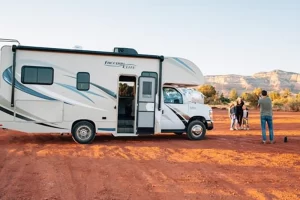
Living Quarters Maintenance
Don’t forget about the inside of your RV. You’ll be sleeping, eating, and hanging out here for days, weeks, or even months at a time if you’re an RV nomad, so you ought to make sure everything is functioning properly.
Keep these living quarters maintenance tips in mind to maximize your comfort:
Roof Inspection
The roof is crucial for overall RV safety, but it’s doubly important for keeping your living quarters dry and comfortable. Consider the following during your inspection:
- Cracks: Especially around seams, vents, and air conditioners.
- Leaks: Check for water stains on the ceiling or walls after heavy rain.
- Sealant Condition: Inspect the sealant around vents, air conditioners, skylights, and other roof penetrations for any drying, cracking, or gaps.
Window and Door Seals
Proper window and door seals prevent drafts, leaks, and unwanted insects from entering your RV. Check for tears, rips, cuts, or holes in the seals around windows and doors. Ensure the seals are still soft and pliable, not dry or brittle, as well.
Smoke and Carbon Monoxide Detectors
Smoke and carbon monoxide detectors are life-saving devices. Test the batteries in your smoke and carbon monoxide detectors monthly and replace them if needed. Push the test button on each detector to ensure they emit a loud, clear alarm, too.
Appliance Checks
Ensure all your RV’s appliances are functioning properly, including the following:
- Fridge: Test the fridge on both AC and DC power to ensure it cools adequately.
- Stove: Light each burner on the stove and check for proper ignition and flame strength.
- Water Heater: Turn on the water heater and test the hot water at the faucets.
- Air Conditioner and Heater: Turn on both the air conditioner and heater to ensure they function properly.
Bonus Checks
The RV maintenance checks mentioned above are some of the most significant ones for any traveler to perform, whether you’re a weekend warrior or plan to spend weeks or months on the road.
If you’re a little more handy, you can also carry out these additional maintenance tasks to ensure your RV runs as it’s supposed to:
Air Filter
Replace or clean the RV air filters at least once every few months. If you frequently travel in dusty areas, you may need to clean or replace them more frequently.
Battery
Use a voltmeter to test your RV’s battery. Here are some guidelines to keep in mind when reading the results:
- 12.5 – 12.7 volts: The battery is fully charged.
- 12.2 – 12.4 volts: The battery is partially charged.
- Below 12.2 volts: The battery is discharged and needs to be charged immediately.
- Below 10.5 volts: The battery might be severely damaged and require replacement.
Sewer Hose
Flush the hose with water to ensure it does not have any obstructions or leaks. Be sure to inspect it regularly throughout the camping season and after heavy use to save yourself from an unfortunate (and smelly) accident.
When to Call a Professional
What should you do if you notice something is off during your RV maintenance checks? You may be able to handle chores like replacing a lightbulb or changing a tire yourself. For more serious issues, though, reach out to an expert.
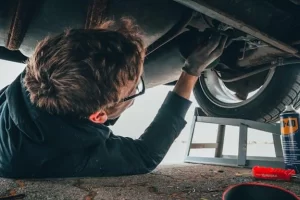
Not sure when to call in a pro? Here are some situations in which they can help:
- Complex Repairs: If the problem you’re facing involves the engine, transmission, brakes, or major electrical systems, it’s best to leave it to a qualified RV technician.
- Suspected Leaks: While you can perform a visual roof inspection, identifying and repairing leaks, especially hidden ones, can be tricky.
- Major Appliance Issues: If your RV’s appliances, such as the refrigerator, water heater, or air conditioner, malfunction significantly, it might be beyond a DIY fix.
- Electrical System Problems: Electrical issues can be dangerous and pose a fire risk. If you experience flickering lights, strange electrical odors, or malfunctioning electrical components, don’t hesitate to call a professional RV electrician.
Final Thoughts
Take ownership of your RV with these essential DIY RV maintenance checks, and you’ll be a more confident and prepared owner.
Regular upkeep not only ensures a smooth and safe journey but also extends the life of your valuable RV. Remember, a little effort on your part can prevent major headaches down the road.
If you notice any issues during your RV inspection and need professional RV repairs, our team at Leisure Coachworks is here to help.
Contact us today to learn more about our services, or visit our online store to purchase high-quality RV parts at great prices.
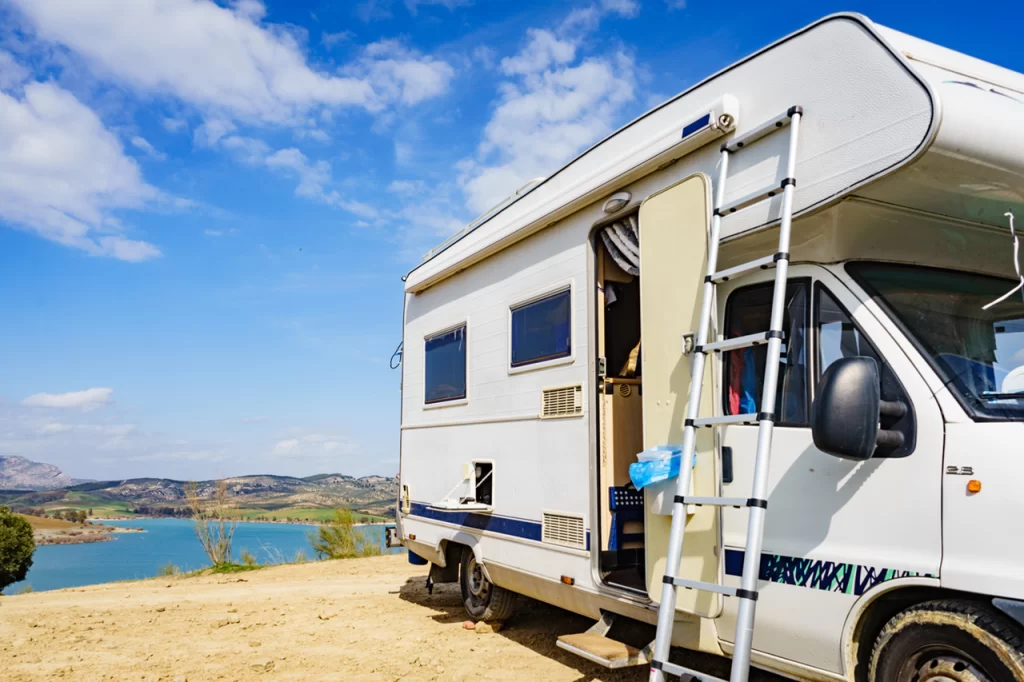
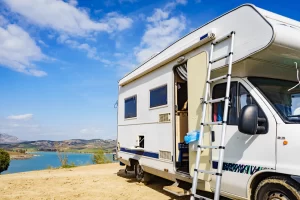
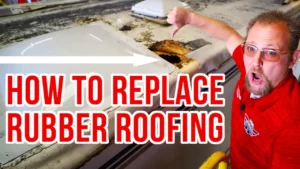
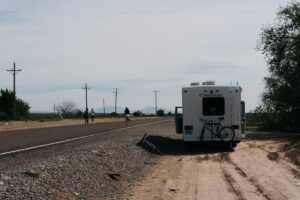
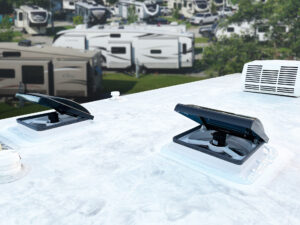
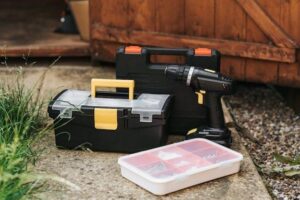
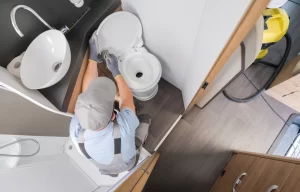
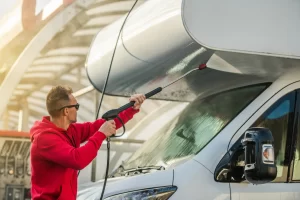
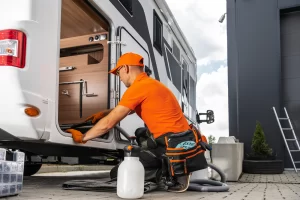
1 Comment
Thank you for sharing these essential checks. Maintenance is an inevitable thing for peaceful living and driving on the road. Protective coatings are also essential for RV roof maintenance. I am also currently using RV Roof Magic rubber roof sealant to maintain my RV rubber roof. A liquid RV roof has given me the best solution for all kinds of RV roofing issues like leaks, cracks, wear n tears with just its primer free, single coating. After the product dried, it looked like someone put on a brand-new rubber membrane. It’s the only liquid butyl rubber in the world that is solvent based having unique features that fix leaks the first time as well as flaking or future peeling. I highly recommend this amazing sealant to every RV owner out there.